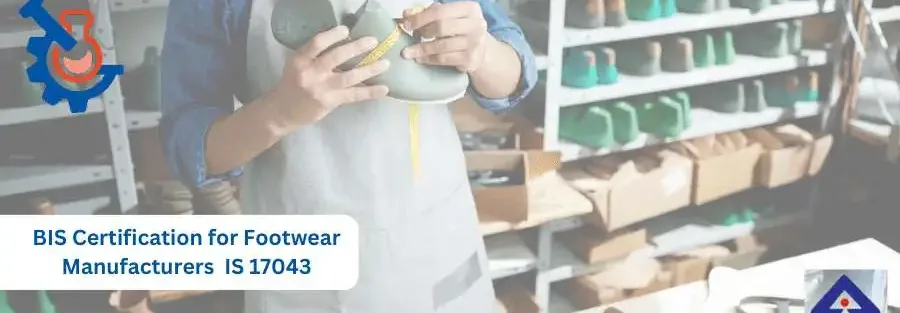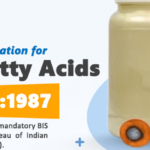IS 17043 is the Indian Standard for Footwear and outlines the requirements that must be met by footwear manufacturers to obtain BIS certification. The standard provides guidelines for the design, construction, and testing of footwear to ensure that it meets the specified quality standards.
Here is an overview of the key elements of IS 17043:
- Scope: The scope of IS 17043 covers all types of footwear, including shoes, sandals, boots, and slippers.
- Requirements: The standard specifies the requirements that footwear manufacturers must meet to obtain BIS certification, including those related to materials, construction, labeling, and performance.
- Testing Methods: The standard provides testing methods for evaluating the quality and performance of footwear, including tests for slip resistance, durability, and impact resistance.
- Design and Construction: The standard provides guidelines for the design and construction of footwear to ensure that it is safe, comfortable, and functional.
- Materials: The standard specifies the requirements for the materials used in the construction of footwear, including those related to strength, durability, and chemical composition.
- Labeling: The standard provides guidelines for labeling footwear, including the requirements for the BIS logo and certification mark.
- Packaging: The standard provides guidelines for the packaging of footwear to ensure that it is protected during transportation and storage.
- Marking: The standard provides guidelines for marking footwear, including the requirements for size, color, and placement of markings.
- Maintenance and Care: The standard provides guidelines for the maintenance and care of footwear to ensure that it remains safe and functional throughout its lifespan.
Overall, IS 17043 provides comprehensive guidelines for the design, construction, and testing of footwear to ensure that it meets the specified quality standards and is safe and functional for consumers.
Quality Control Orders on Footwear Products
Quality Control Orders (QCO) on footwear products are regulations that have been put in place by the Indian government to ensure that the quality of footwear products in the market meets a certain standard. These orders are designed to protect consumers from substandard products and to promote fair competition among manufacturers. The QCOs cover a wide range of parameters, including the materials used in the construction of the footwear, the strength of the footwear, the durability of the footwear, and the labeling of the product.
Manufacturers must comply with the QCOs to obtain certification from the Bureau of Indian Standards (BIS) and to sell their products in the Indian market. The QCOs are enforced through regular inspections and testing of footwear products, and manufacturers who fail to meet the specified standards are subject to penalties and fines.
The QCOs have helped to improve the quality of footwear products in India, and consumers can now purchase footwear products with greater confidence knowing that they have been certified by the BIS and meet the required standards.
Overall, the QCOs on footwear products have played a crucial role in ensuring that the Indian market is flooded with only high-quality and safe footwear products.
BIS Certification for Leather Footwear and Footwear Compound:
BIS certification for leather footwear and footwear compounds is a process that ensures that the quality of leather footwear and footwear compounds produced in India meets the specified standards set by the Bureau of Indian Standards (BIS). The BIS certification process involves rigorous testing and inspection of the footwear products to ensure that they meet the specified standards for safety, quality, and performance.
To obtain BIS certification for leather footwear, manufacturers must comply with the Indian Standard IS 15298.
This standard specifies the requirements for materials, design, construction, performance, and labeling of leather footwear. The standard covers a wide range of parameters, including the thickness and strength of the leather, the adhesives used in construction, the slip resistance of the sole, and the labeling of the product.
To obtain BIS certification for footwear compounds, manufacturers must comply with the Indian Standard IS 15292.
This standard specifies the requirements for the quality of footwear compounds used in the manufacture of leather footwear. The standard covers a wide range of parameters, including the chemical composition of the compound, its physical properties, and its performance characteristics.
Manufacturers who obtain BIS certification for their leather footwear and footwear compounds can use the BIS logo and certification mark on their products, providing consumers with a guarantee of quality and safety.
The certification process also helps manufacturers to improve the quality of their products, increase customer trust, and access new markets.
Overall, BIS certification for leather footwear and footwear compound plays a crucial role in ensuring that the Indian market is flooded with only high-quality and safe footwear products, and consumers can purchase these products with confidence, knowing that they meet the required standards.
BIS Certification for Rubber & Polymeric Material Footwear
BIS certification for rubber and polymeric material footwear is a process that ensures that the quality of rubber and polymeric material footwear produced in India meets the specified standards set by the Bureau of Indian Standards (BIS).
The BIS certification process involves rigorous testing and inspection of the footwear products to ensure that they meet the specified standards for safety, quality, and performance.
To obtain BIS certification for rubber and polymeric material footwear, manufacturers must comply with the Indian Standard IS 15298. This standard specifies the requirements for materials, design, construction, performance, and labeling of rubber and polymeric material footwear.
The standard covers a wide range of parameters, including the physical properties of the materials used in the construction of footwear, such as slip resistance, abrasion resistance, and water resistance.
Manufacturers who obtain BIS certification for their rubber and polymeric material footwear can use the BIS logo and certification mark on their products, providing consumers with a guarantee of quality and safety.
The certification process also helps manufacturers to improve the quality of their products, increase customer trust, and access new markets.
The BIS certification for rubber and polymeric material footwear has played a crucial role in ensuring that the Indian market is flooded with only high-quality and safe footwear products.
This certification process assures consumers that the footwear products they purchase are safe, reliable, and meet the required standards.
By promoting the use of quality materials and production techniques, BIS certification for rubber and polymeric material footwear has also contributed to the growth of the Indian footwear industry.
BIS Standards for PPE Footwear
BIS standards for Personal Protective Equipment (PPE) footwear are specifications and requirements set by the Bureau of Indian Standards (BIS) to ensure that the PPE footwear manufactured and sold in India meets the necessary safety standards. PPE footwear is an essential component of personal protective equipment that is designed to protect workers from hazardous work environments.
The BIS has issued standards for PPE footwear under the IS 15298 series of standards. These standards specify the requirements for the design, construction, performance, and testing of PPE footwear. The standards cover a wide range of parameters, including the materials used in the construction of the footwear, the strength and durability of the footwear, the slip resistance of the sole, and the labeling of the product.
The BIS standards for PPE footwear apply to various industries, including construction, mining, chemical manufacturing, and other industries where workers are exposed to hazardous work environments.
Manufacturers of PPE footwear must comply with the BIS standards to obtain certification and sell their products in the Indian market.
The BIS standards for PPE footwear play a crucial role in protecting workers from accidents and injuries in hazardous work environments. By setting minimum requirements for the design, construction, and performance of PPE footwear, these standards help to ensure that workers are adequately protected while performing their duties.
Compliance with the BIS standards also promotes fair competition among manufacturers and helps to build customer trust in the quality of PPE footwear products.
Overall, the BIS standards for PPE footwear contribute to the safety and protection of workers in various industries and play a significant role in ensuring a safer work environment.
Process of BIS Certification For Footwear
The BIS certification process for footwear is a rigorous process that involves several steps to ensure that footwear products meet the required safety, quality, and performance standards. The following is a brief overview of the process:
- Application: The first step in the certification process is to apply to the Bureau of Indian Standards (BIS). The application should contain all the necessary details of the product, including the type of footwear, materials used, and intended use.
- Sample Testing: Once the application is accepted, the manufacturer must submit samples of the product to a BIS-approved testing laboratory for testing. The laboratory conducts various tests on the sample to ensure that it meets the required safety and performance standards.
- Factory Inspection: After the samples have passed the laboratory tests, the manufacturer’s factory is inspected by a BIS officer to ensure that the production process meets the required standards and guidelines. The inspection includes a review of the production facilities, quality control measures, and record-keeping procedures.
- Grant of Certification: If the sample tests and factory inspection are successful, the BIS grants a certification license to the manufacturer. The license includes the BIS certification mark, which can be used on certified footwear products.
- Surveillance: Once the certification is granted, the BIS conducts periodic surveillance inspections to ensure that the manufacturer continues to meet the required standards and guidelines.
The BIS certification process for footwear products is designed to ensure that only high-quality and safe products are sold in the Indian market.
The certification process provides customers with confidence that the products they purchase meet the necessary safety and performance standards. The BIS certification also helps manufacturers to improve the quality of their products and access new markets, contributing to the growth of the Indian footwear industry.
Document Required For BIS Certification For Footwear
The Bureau of Indian Standards (BIS) requires certain documents to be submitted as part of the certification process for footwear products. The following is a list of documents required for BIS certification for footwear:
- Application form: The application form should contain all the necessary details of the product, including the type of footwear, materials used, intended use, and manufacturer’s details.
- Test report: A test report from a BIS-approved laboratory indicating that the product has passed all the necessary safety and performance tests.
- Factory inspection report: A factory inspection report from a BIS officer indicating that the production process meets the required standards and guidelines.
- Quality manual: A quality manual outlining the quality control measures and procedures implemented by the manufacturer to ensure the production of high-quality and safe footwear products.
- List of equipment and machinery: A list of equipment and machinery used in the production process.
- Bill of materials: A detailed list of materials used in the production of the footwear product.
- Production flow chart: A production flow chart showing the various stages of the production process.
- Labeling details: A detailed labeling plan showing the details of the labeling, including the certification mark, name of the manufacturer, product name, and other relevant details.
- Factory layout: A factory layout showing the production facilities and the placement of equipment and machinery.
The above documents are required to obtain BIS certification for footwear products. The BIS certification process is designed to ensure that only high-quality and safe products are sold in the Indian market, and the submission of the required documents plays a crucial role in the certification process.
Conclusion:
In conclusion, the BIS certification for footwear is a crucial process that ensures that footwear products meet the necessary safety, quality, and performance standards. BIS has set specific standards for different types of footwear products, including leather footwear, rubber and polymeric material footwear, and PPE footwear.
The certification process involves submitting an application, testing samples of the product, inspecting the factory, and obtaining the certification license.
The required documents for certification include the application form, test report, factory inspection report, quality manual, list of equipment and machinery, bill of materials, production flow chart, labeling details, and factory layout. Compliance with BIS standards promotes fair competition among manufacturers, builds customer trust in the quality of footwear products, and contributes to a safer work environment.
Therefore, BIS certification is essential for footwear manufacturers who want to sell their products in the Indian market and maintain a competitive edge.



